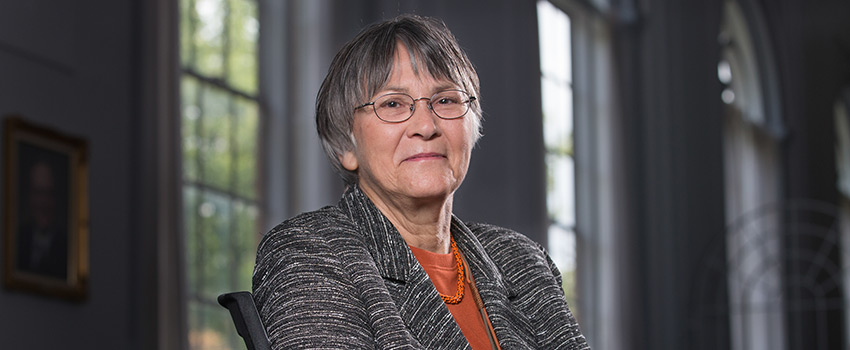Finding light in the dark
Brenda Hollis ’68

Brenda Hollis ’68 has seen the most wicked acts of mankind, often in graphic detail too hideous to repeat. Her work as an international prosecutor has brought her face-to-face with individuals involved in war crimes, genocide and a litany of heinous crimes against humanity.
But being exposed to all of that evil has not extinguished the fire of hope inside her. While working tirelessly to bring the perpetrators of such gross criminality to justice, Hollis has been bolstered by the strength of the victims.
“I was seeing perhaps the darkest side of man, but I was also seeing the hope that we have, because I saw victims and survivors who were incredibly courageous and incredibly strong,” she said.
Hollis, a 1968 graduate of the University who spent two years with the Peace Corps in West Africa before earning a law degree and then serving more than 20 years in the United States Air Force, was selected to serve as an expert counsel and lead prosecutor in several high-profile cases.
She was involved with the International Criminal Tribunal in the prosecution of brutal dictators Charles Taylor of Liberia and Slobodan Milosevic of Yugoslavia. The secretary-general of the United Nations also called on her to serve as prosecutor of the Residual Special Court for Sierra Leone, where a brutal civil war claimed 50,000 lives.
“I think I’ve seen the balance of good and evil in this world, and it has made me appreciative of the strength and courage and resilience of the victims, and their willingness to stand up against perhaps the majority and speak out against things that are wrong,” said Hollis, who continues follow-up work on major international cases. “And it’s also made me very sensitive to the fact that we have a lot of people out there who are just not good people.”
Hollis, who retired from the Air Force in 1998 with the rank of colonel, said her passion to seek justice got its start in her formative years when she observed what she felt was a very unjust world. She saw that the plight of women, especially those from a poor background, was especially harsh.
“I think early on I appreciated the injustices that were there, the courage of some people to change them, and the resistance of others who benefitted from those injustices,” she said. “And because I was female, I was subjected to a number of those injustices in an indirect way. My opportunities were, in many ways, very limited and expectations of me were very traditional, and I always rebelled against that.”
She came from a small town and attended a high school that did not offer advanced courses, or athletics for girls. Hollis found those things at BGSU, where she enthusiastically explored her myriad educational opportunities.
“At Bowling Green, I experienced a wonderful mental and physical awakening. All of a sudden, this entire world of intellectual disciplines was open to me, and because I was in the honors program I had much more freedom to choose courses and to take extra courses, and I took full advantage of that. I also was involved with a lot of competitive athletic teams, so I could develop both aspects of my life,” she said.
Hollis arrived at Bowling Green with no clear career path in mind, and absorbed everything she could, calling it a “truly enjoyable experience.” With that substantial foundation in place, Hollis left BGSU a proud product of public education, and she remains a passionate proponent.
“I think a quality public education is critical to a well-functioning democracy, and I think the challenge to our society is to ensure that all people have equal access to a good education,” she said. “I think a well-informed, well-educated populace capable of rational thought and civility and discourse is essential to a democracy, and I think that public education gives you that.”
She added that public education can play a huge role in addressing some of the most persistent issues in society.
“I think public education is a great leveler. It brings together people of different socio-economic classes, of different religions, of different color, and you learn to break down the stereotypes,” she said. “You learn to take people on as individuals, and not to dismiss them because of stereotypes.”
Hollis said supporting public education is one of the most vital roles of both federal and state government, and that she directly benefitted from that support. She said the philanthropy of individuals is increasingly important as public universities deal with mounting financial pressures.
“We owe it to the next generation and the world to ensure robust higher education opportunities for as many students as possible,” she said.
Updated: 01/23/2018 04:49PM
